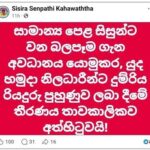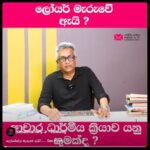Ajith Parakum Jayasinghe
On November 21, a joint protest of a common opposition has been called. Apparently, the main parties supporting it are the Sri Lanka Podujana Peramuna, the United National Party, and the Sri Lanka Freedom Party. Several other parties, including Udaya Gammanpila’s Pivithuru Hela Urumaya, have announced their participation.
Meanwhile, the Samagi Jana Balawegaya has publicly stated that it will not participate. Individuals like Dilith Jayaweera and Wimal Weerawansa have questioned a program. Apparently, they cannot unite without a program.
At this time, I don’t think a ‘program’ is necessary to protest against the government. Protesting the government itself should be the program.
What is the protest for? In fact, the protest should be against the government’s lies. Against the politics of revenge. Against inefficiency. Against the lack of development in the country. Against the intolerance of democracy. Against the postponement of the provincial council election.
Although the United National Party and the Sri Lanka Freedom Party, which took the lead in postponing the provincial council election, are part of this protest, the Sri Lanka Podujana Peramuna has never postponed elections. During the 2015 yahapalana era, the trick of postponing provincial councils was told to Sirisena, who was destined to lose, by JVP through Dilan Perera. More details on that later.
What is the protest for? It is for power politics. For gaining power. Even in that regard, JVP is a party with a long history of carrying out various activities and contributing to such activities for overthrowing governments and seizing power. In front of a party that has promoted such a culture, others don’t need to observe precepts. That’s how power politics is.
Although JVP won votes, it has been proven over the past year that they lack the capability to engage in grassroots politics. Opposition political parties should enter ground-level politics in a new way. The way to correct their past mistakes is to work on the ground in a new way.
It is not necessary to gather enough people to shake Colombo on the 21st. A noticeable protest rally is sufficient.
The leaders of the joint opposition should try to unite as many forces as possible. In that regard, maximum effort should be made to include the Samagi Jana Balawegaya as a party. Sajith Premadasa is the official Opposition Leader. The Samagi Jana Balawegaya is the main opposition. This should not be forgotten. However, their non-participation should not be made into a big problem.
The reason for that is the alignment of the right-wing neo-liberal yahapalana policies currently being followed by the Janatha Vimukthi Peramuna government with the policies of the Samagi Jana Balawegaya. Accordingly, they become competitors within the same political stream.
Anyway, no one has significant alternatives regarding Sri Lanka’s economy. In socio-political matters, the only division is between becoming slaves to Western strategies or becoming more nationalistic. In that regard, JVP and SJB are in the same camp. With the UNP’s alliance with the Pohottuwa during the 2022-24 period, it developed a certain nationalist tendency.
The opportunity for an alternative force in the opposition lies within nationalism. Tamil nationalism in the North and Sinhala Buddhist nationalism in the South could re-emerge. Specifically, there could be a rise of the Sinhala-Buddhist force. In that context, there is an opportunity for a more democratic Sinhala-Buddhist nationalism instead of the old Sinhala-Buddhist supremacism.
Competition between the SJB and the Pohottuwa alliance in the opposition is inevitable. Therefore, the likelihood of SJB participating in the November 21 event is minimal. I think the November 21 event will be the beginning of a new journey for Pohottuwa.











